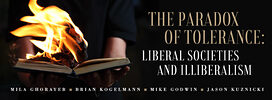Lead Essay
Mila Ghorayeb looks at liberal polities’ use of antidemocratic tactics against illiberal groups. She concludes that it is not necessarily paradoxical to limit political participation with a view to preserving an imperfect democracy, but that whether it is desirable or feasible are different questions.
Response Essays
Brian Kogelmann says that a democracy shouldn’t compromise on democratic participation. Allowing antidemocratic groups to participate runs the risk that they might win and restrict the franchise, but restricting their participation creates a new form of political inequality. It is therefore preferable to allow them to participate.
Rather than restricting antidemocratic groups, Jason Kuznicki proposes to safeguard democratic and other rights by articulating them in an impersonal way and making it constitutionally difficult for anyone to change them. Under such conditions, open participation by antidemocrats becomes less risky, and persecuted minorities can organize for their own protection.
Mike Godwin argues that democracies should tolerate antidemocratic activism—at least as an initial response. Yet democracies’ responses to antidemocratic activism need not end there. He urges the defenders of liberal democracy to better articulate how to respond to antidemocratic critiques. Such critiques need not lead us to abandon democracy, and at times they might even draw attention to genuine shortcomings in a democratic polity.
Coming Up
Conversation through the end of the month.

